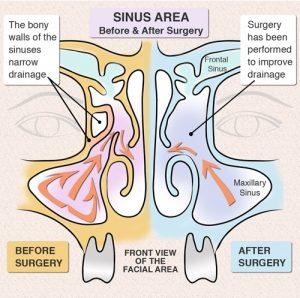
If the medical treatments prescribed by your doctor fail to control your symptoms, sinus surgery may be suggested.
The standard procedure for chronic rhinosinusitis is Functional Endoscopic Sinus Surgery (FESS). The goal for every patient undergoing sinus surgery is to remove the disease in key areas, to restore adequate aeration and drainage of the sinuses, to remove nasal polyps if present, and to restore normal nasal functioning.
The surgeon will insert a small tube with a tiny camera into the nostrils and guide it into the sinus cavities. The diseased tissues will be removed using additional instruments. During the operation, the surgeon may also remove the disease in key areas in order to restore adequate aeration and drainage of the sinuses. Endoscopic surgery is usually performed as an outpatient procedure.
Sinus surgery offers a significant improvement of patient's quality of life. In particular, sinus surgery will relieve most of the symptoms that are attributable to chronic sinusitis such as nose obstruction, runny nose, nasal secretions in the throat, and facial pain. The effects of surgery on reduced smell vary strongly between patients and depend on the extent of the disease. Surgery is also expected to improve patient's sleep quality, work performance and daytime fatigue.
Sinus surgery is a challenging procedure and despite the availability of new instrumentation, complications during surgery may still occur. The major complications include bleeding, intracranial injury (inside the skull), and visual disturbances. Examples of minor complications include effusion of blood around the eye ('blue eye') or redness of the skin around the eye, watery eyes, scar formation inside the nose and persistence of the disease.
In approximately 20% of patients undergoing surgery, symptoms will recur. Poorer surgical outcomes were shown in patients with:
Best post-operative care
The best post-operative care after a sinus surgery is intensive and frequent rinsing of the nose and sinuses with large amounts of saline water and (re-)starting your nasal medication, for instance nasal corticosteroid sprays. You will also see your ENT doctor more frequently during the first weeks to months after sinus surgery. These extra visits are used for cleaning your nose and sinuses for example of blood crusts and giving extra care if necessary.
Pain in the post-surgical period is very uncommon and it is considered a sign of persistent inflammation. However, every patient is different and depending on the extent of your surgery, the usage and type of nasal sponge that is used to prevent or control bleedings inside the nose, you may experience some discomfort, congestion and headache during the early recovery period. In such case, your doctor will prescribe painkillers for the first few days.
Most nasal symptoms improve after sinus surgery. Recovery from sinus surgery is individual and depends on your health and type of procedure, but most people need to be away from work or school for several days. Once your nose and sinuses are healed, you should be able to resume your normal activity level. You will have some swelling and soreness inside your nose after the surgery, but this is normal. Likely your doctor may recommend nasal rinsing with saline to manage your symptoms after surgery.
Since chronic sinusitis is a chronic inflammatory disease surgery cannot free you from the disease forever. Even after sinus surgery continuous medical treatment is necessary for lifetime since asymptomatic disease persists. Additionally, in approximately 20% of patients undergoing surgery, symptoms will recur and revision surgery might be indicated.
In general, we tend to be much more conservative when treating children than adults with chronic sinusitis. Sinus surgery during childhood is preserved for really serious conditions such as persistent disease in patients with cystic fibrosis as well as orbital (eye) and intracranial (inside the skull) complications.
Treating symptoms of chronic rhinosinusitis by surgery can improve symptoms of asthma, as the inflammation of your sinuses (upper airways) and the inflammation of your lungs (lower airways) are related.